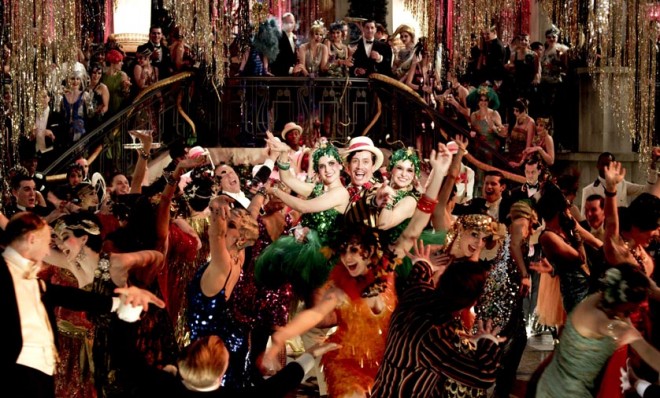Is The Great Gatsby worth seeing, or not?
Baz Luhrmann's lavish 3D adaptation of the Great American Novel is polarizing, to say the least


A free daily email with the biggest news stories of the day – and the best features from TheWeek.com
You are now subscribed
Your newsletter sign-up was successful
After a long and troubled production process, Baz Luhrmann's $100 million 3D adaptation of The Great Gatsby is finally hitting theaters — and the reviews are just as polarized as you might expect. (Watch a trailer for The Great Gatsby below.) Critics are pretty much equally divided on Luhrmann's lavish film adaptation of the Great American Novel, which currently has 46 percent positive reviews at aggregator Rotten Tomatoes.
But here's the key question: Is the film worth your time, or not? To help you find an answer, here's a sampling of some of the smartest opinions about The Great Gatsby:
1. The visuals are overwhelming — and not necessarily in a good way
The Week
Escape your echo chamber. Get the facts behind the news, plus analysis from multiple perspectives.

Sign up for The Week's Free Newsletters
From our morning news briefing to a weekly Good News Newsletter, get the best of The Week delivered directly to your inbox.
From our morning news briefing to a weekly Good News Newsletter, get the best of The Week delivered directly to your inbox.
The Great Gatsby's "only governing principle is maximalism," says Joe Morgenstern at the Wall Street Journal. "Everything has been made as big as possible, apart from conversational interludes, when big feelings are displayed, like bullet points, by actors striking static poses." When it comes to the film's visual style, "Luhrmann doesn't just gild the lily, he spray-paints it with glow-in-the-dark sparkles," agrees Dana Stevens at Slate. And even if you're enchanted by the film's grandiose visual style, you can probably skip the 3D glasses (and the surcharge that comes with them). At NPR, Linda Holmes calls the 3D effects "gaudy and inessential," echoing the sentiment expressed by most critics — including those who gave The Great Gatsby positive reviews.
2. The performances are strong…
One thing most critics seem to agree on: Whatever The Great Gatsby's flaws, its sprawling, star-studded cast gives it their all. Tobey Maguire, playing the novel's narrator Nick Carraway, offers "a surprisingly quiet performance at this chaotic movie's heart," and delivers Fitzgerald's prose beautifully, says Stevens at Slate. "Fresh face Elizabeth Debicki exudes appeal as brassy Jordan Baker, and Joel Edgerton is especially strong as brutish Tom Buchanan," says Ben Kenigsberg at The AV Club. But most critics reserve their highest praise for Leonardo DiCaprio's performance in the title role. "Leonardo DiCaprio gives us the full Gatsby, assured yet insecure, and he's magnificent," says Ty Burr at the Boston Globe. And DiCaprio manages to handle both the film's quietest and most bombastic moments, says Chris Orr at The Atlantic, in a performance that's simultaneously "charming yet uncertain, magnetic yet self-effacing."
3. …with the exception of Carey Mulligan
A free daily email with the biggest news stories of the day – and the best features from TheWeek.com
Underwhelming as she is, it's hard to fault Carey Mulligan for her muddled performance as Daisy Buchanan, says Keith Phipps at NPR; "a cipher on the page, she's not easily rendered as flesh and blood on the screen, even by an actress of Mulligan's skill." At The Atlantic, Orr labels Mulligan "a minor disaster," though he lays most of the blame at Luhrmann's feet for failing to comprehend Fitzgerald's character by recasting her as a tragic heroine instead of a semi-villain. But whether you blame Mulligan, Luhrmann, or F. Scott Fitzgerald for the character's failings, one thing is clear: Daisy doesn't quite work on the silver screen.
4. It's definitely not a boring movie
Whatever else can be said about it, The Great Gatsby is not "a bad movie in the most conventional, will-I-want-my-money back sense," says Orr at The Atlantic. "Luhrmann is, as always, a dazzling ringmaster, and his movie is intermittently quite entertaining." For all its failings, this adaptation is "a larger and more ambitious screen Gatsby than has ever been seen before," says Andrew O'Hehir at Salon. Luhrmann's adaptation "isn't a disaster," says Matt Zoller Seitz at RogerEbert.com. "Every frame is sincere," and "even when the movie's not working, its style fascinates."
Consensus: The Great Gatsby is a love-it-or-hate-it proposition, but if you have any interest whatsoever in the material, you should see it for yourself — if only to be a part of the heated debate.
Scott Meslow is the entertainment editor for TheWeek.com. He has written about film and television at publications including The Atlantic, POLITICO Magazine, and Vulture.
-
 The Olympic timekeepers keeping the Games on track
The Olympic timekeepers keeping the Games on trackUnder the Radar Swiss watchmaking giant Omega has been at the finish line of every Olympic Games for nearly 100 years
-
 Will increasing tensions with Iran boil over into war?
Will increasing tensions with Iran boil over into war?Today’s Big Question President Donald Trump has recently been threatening the country
-
 Corruption: The spy sheikh and the president
Corruption: The spy sheikh and the presidentFeature Trump is at the center of another scandal
